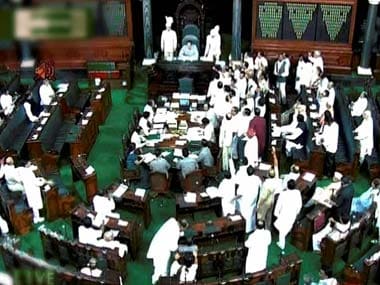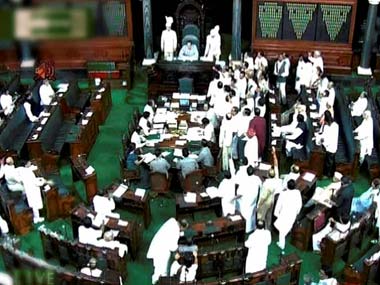The Modi government’s decision to push through the insurance and coal mine auction bills through ordinances rather than wait for parliament to resume for the budget session has been criticised by opposition parties – especially the Left, the Trinamool Congress and the Congress itself. Experts are clear that there is absolutely nothing wrong with issuing ordinances once parliament is adjourned. As senior counsel Harish Salve told
The Economic Times
, “This is absolutely the right thing to do. These are not bills that have been rejected by the House. In that case, it would have been an abuse of the Constitution.” However, this has not stopped representatives of the opposition parties from slamming the proposed ordinances as “unethical” and undemocratic. While the
Congress railed against the NDA’s “ordinance raj
”, Derek O’Brien of the Trinamool Congress and Sitaram Yechury of the CPI(M) saw the ordinances as attempts to bypass the democratic process and “imposing an authoritarian manner of parliamentary functioning.” [caption id=“attachment_1834717” align=“alignleft” width=“380”]
 Representational image. PTI[/caption] This is a bit rich, for the fact is these bills could not even be presented in the Rajya Sabha given the opposition’s “democratic” disruption. So, to pretend that issuing an ordinance is somehow wrong or authoritarian will fool no one, for the fact is these bills will anyway have to come back to the Rajya Sabha for passing. The question then is: why didn’t the opposition use its majority to defeat these bills rather than just obstruct the business of the Rajya Sabha by bringing in all kinds of extraneous issues? It is tempting to believe that a Sadhvi’s remarks or someone’s opinions of Godse or the Sangh’s “conversion” agenda were the key cause of disruptions. The fact is even before these Sangh-based issues cropped up, the Rajya Sabha was disrupted for other reasons: Modi’s failure to bring back black money, the use of the CBI against political opponents, etc. This shows that the opposition’s real agenda was to find excuses to block the introduction and discussion of bills, and not necessarily to raise issues of concern. To understand the nature of the opposition’s double-speak, we should go back to Salve’s statement above, where he pointed out that ordinances would be wrong only if these bills had been rejected by the house. Why didn’t the opposition not reject these bills so that no ordinances could be issued? Answer: that wouldn’t have worked for them. The real reason why the opposition preferred disruption to discussion was to ensure that the Modi government’s key bills were neither passed nor rejected. If they were passed, they would have been seen as a feather in Modi’s cap, which neither the Congress nor the other detractors want. But they don’t want the bills to be rejected by the house either, as this would enable the government to call a joint session of parliament to end the deadlock. In a joint session, the NDA government holds the edge and the Lok Sabha speaker presides over it. So no chance of disruption. In the Rajya Sabha, the BJP/NDA position is just about 60-and-odd members in a current house strength of 243 ( including 10 members nominated by the previous UPA government). The BJP itself has 45 members and the Congress 69. However, the real situation for the BJP is not as bad if you add up the numbers of the neutral parties like the AIADMK (11), BJD (7), NCP (6), etc. The BJP’s potential numbers then go up to a range of 85-90 – especially after adding up some single member parties (see the Rajya Sabha party numbers
here
to make your own calculations). After this, there are parties that usually position themselves against the BJP, but which may sometimes support and, at other times, be persuaded to opt for strategic walkouts to enable the government to pass its bills. These parties could include the Samajwadi Party (15), the DMK (4), the BSP (10), and even the Congress. The nominated members could also, on occasion, vote with the government. One does not expect the likes of Anu Aga (of Thermax) or Sachin Tendulkar to be voting purely along party lines on an insurance bill or coal blocks. This reality is what the disruptionists are afraid of. The key disruptionist parties – mainly the Trinamool, the Left, the Janata Dal (United), the RJD, and, to a lesser extent, the JD(S) and the INLD - are disruptionist because they know that many legislations can be passed by the Rajya Sabha even with the government’s low official numbers. The Congress knows this, which is why it allows these parties to disrupt, and then plead that it is not responsible even for the bills it supports when the government can’t ensure order in the house – a necessary condition for passing bills. The disruption is thus a tactic to enable a very small minority of members to cock-a-snook at the BJP and trip it on legislation. It is about denying the BJP a politico-economic gain, rather than about anything they really believe in. As for actually rejecting a bill, the disruptionists know that the government has the numbers to pass any bill in a joint session of parliament. That is something they want even less. With over 330 NDA Lok Sabha MPs, and with more than 70-80 MPs on its side in the Rajya Sabha, a joint LS-RS session will arm the BJP with more than 400 MPs at least in a 788-member joint session One cannot be sure that these disruptionists will see reason even in the budget season. The government will thus have to try and get the chair to either remove disruptive members from the house, or force a vote in the Rajya Sabha on these bills so that they can either be defeated or passed. The government has to defeat the disruptionists’ strategy of neither passing nor rejecting its bills.
Representational image. PTI[/caption] This is a bit rich, for the fact is these bills could not even be presented in the Rajya Sabha given the opposition’s “democratic” disruption. So, to pretend that issuing an ordinance is somehow wrong or authoritarian will fool no one, for the fact is these bills will anyway have to come back to the Rajya Sabha for passing. The question then is: why didn’t the opposition use its majority to defeat these bills rather than just obstruct the business of the Rajya Sabha by bringing in all kinds of extraneous issues? It is tempting to believe that a Sadhvi’s remarks or someone’s opinions of Godse or the Sangh’s “conversion” agenda were the key cause of disruptions. The fact is even before these Sangh-based issues cropped up, the Rajya Sabha was disrupted for other reasons: Modi’s failure to bring back black money, the use of the CBI against political opponents, etc. This shows that the opposition’s real agenda was to find excuses to block the introduction and discussion of bills, and not necessarily to raise issues of concern. To understand the nature of the opposition’s double-speak, we should go back to Salve’s statement above, where he pointed out that ordinances would be wrong only if these bills had been rejected by the house. Why didn’t the opposition not reject these bills so that no ordinances could be issued? Answer: that wouldn’t have worked for them. The real reason why the opposition preferred disruption to discussion was to ensure that the Modi government’s key bills were neither passed nor rejected. If they were passed, they would have been seen as a feather in Modi’s cap, which neither the Congress nor the other detractors want. But they don’t want the bills to be rejected by the house either, as this would enable the government to call a joint session of parliament to end the deadlock. In a joint session, the NDA government holds the edge and the Lok Sabha speaker presides over it. So no chance of disruption. In the Rajya Sabha, the BJP/NDA position is just about 60-and-odd members in a current house strength of 243 ( including 10 members nominated by the previous UPA government). The BJP itself has 45 members and the Congress 69. However, the real situation for the BJP is not as bad if you add up the numbers of the neutral parties like the AIADMK (11), BJD (7), NCP (6), etc. The BJP’s potential numbers then go up to a range of 85-90 – especially after adding up some single member parties (see the Rajya Sabha party numbers
here
to make your own calculations). After this, there are parties that usually position themselves against the BJP, but which may sometimes support and, at other times, be persuaded to opt for strategic walkouts to enable the government to pass its bills. These parties could include the Samajwadi Party (15), the DMK (4), the BSP (10), and even the Congress. The nominated members could also, on occasion, vote with the government. One does not expect the likes of Anu Aga (of Thermax) or Sachin Tendulkar to be voting purely along party lines on an insurance bill or coal blocks. This reality is what the disruptionists are afraid of. The key disruptionist parties – mainly the Trinamool, the Left, the Janata Dal (United), the RJD, and, to a lesser extent, the JD(S) and the INLD - are disruptionist because they know that many legislations can be passed by the Rajya Sabha even with the government’s low official numbers. The Congress knows this, which is why it allows these parties to disrupt, and then plead that it is not responsible even for the bills it supports when the government can’t ensure order in the house – a necessary condition for passing bills. The disruption is thus a tactic to enable a very small minority of members to cock-a-snook at the BJP and trip it on legislation. It is about denying the BJP a politico-economic gain, rather than about anything they really believe in. As for actually rejecting a bill, the disruptionists know that the government has the numbers to pass any bill in a joint session of parliament. That is something they want even less. With over 330 NDA Lok Sabha MPs, and with more than 70-80 MPs on its side in the Rajya Sabha, a joint LS-RS session will arm the BJP with more than 400 MPs at least in a 788-member joint session One cannot be sure that these disruptionists will see reason even in the budget season. The government will thus have to try and get the chair to either remove disruptive members from the house, or force a vote in the Rajya Sabha on these bills so that they can either be defeated or passed. The government has to defeat the disruptionists’ strategy of neither passing nor rejecting its bills.
Insurance, coal ordinances: Why the Opp is playing dog in the manger
R Jagannathan
• December 25, 2014, 13:53:53 IST
The opposition has attacked the govt’s decision to issue ordinances for the insurance and coal auction bills. But these bills anyway have to be passed by parliament. The truth is the opposition neither wants to pass bills nor reject them
Advertisement
)